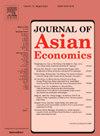The effectiveness of financial industry in promoting the high-quality development of energy industry
IF 3.4
3区 经济学
Q1 ECONOMICS
引用次数: 0
Abstract
The energy sector is central to global decarbonization, and the effective allocation of financial resources is vital to its development. However, the impact of financial resources on energy development remains ambiguous in existing literature. This study bridges this gap by theoretically and empirically analyzing the role of the financial resources allocated to the energy industry. We develop a novel theoretical model that integrates the energy and financial sectors, subsequently deriving an inverted U-shaped relationship between financial resources and energy development. Empirically, we use an energy-related indicator to capture financial resources directed towards the energy sector and validate the hypothesis using panel data from 30 Chinese provinces from 2006 to 2019. The result remains robust after addressing endogeneity concerns and a series of robustness tests. Heterogeneity analysis further shows that the inverted U-shaped relationship is more pronounced in regions with abundant energy resources and high financial development, while the effect in those characterized by underdeveloped financial systems is insignificant. Mechanism analysis reveals that financial resources influence energy development through financing constraints and investment efficiency. This study advances our understanding of the role of finance in energy sector development, offering key policy implications for optimizing financial allocation. Financial institutions should establish appropriate support thresholds to ensure optimal financial resource allocation to the energy sector, while addressing financing constraints and improving investment efficiency. Support strategies should be tailored to regional conditions, such as energy endowments and financial development levels.
金融业促进能源产业高质量发展的有效性
能源部门是全球脱碳的核心,有效分配财政资源对其发展至关重要。然而,在现有文献中,金融资源对能源发展的影响仍然模糊不清。本研究通过理论和实证分析财政资源对能源产业的作用,弥补了这一差距。我们建立了一个新的理论模型,整合能源和金融部门,从而推导出金融资源与能源发展之间的倒u型关系。在实证方面,我们使用能源相关指标来捕捉针对能源部门的金融资源,并使用2006年至2019年中国30个省份的面板数据验证了这一假设。在解决内生性问题和一系列稳健性测试后,结果仍然稳健。异质性分析进一步表明,在能源资源丰富、金融发展程度高的地区,这种倒u型关系更为明显,而在金融体系不发达的地区,这种影响不显著。机制分析表明,金融资源通过融资约束和投资效率影响能源发展。本研究促进了我们对金融在能源部门发展中的作用的理解,为优化金融配置提供了关键的政策启示。金融机构应设立适当的支持门槛,确保金融资源最优配置到能源部门,同时解决融资约束问题,提高投资效率。支持战略应根据区域条件,如能源禀赋和金融发展水平,加以调整。
本文章由计算机程序翻译,如有差异,请以英文原文为准。
求助全文
约1分钟内获得全文
求助全文
来源期刊

Journal of Asian Economics
ECONOMICS-
CiteScore
4.70
自引率
9.40%
发文量
90
期刊介绍:
The Journal of Asian Economics provides a forum for publication of increasingly growing research in Asian economic studies and a unique forum for continental Asian economic studies with focus on (i) special studies in adaptive innovation paradigms in Asian economic regimes, (ii) studies relative to unique dimensions of Asian economic development paradigm, as they are investigated by researchers, (iii) comparative studies of development paradigms in other developing continents, Latin America and Africa, (iv) the emerging new pattern of comparative advantages between Asian countries and the United States and North America.
 求助内容:
求助内容: 应助结果提醒方式:
应助结果提醒方式:


